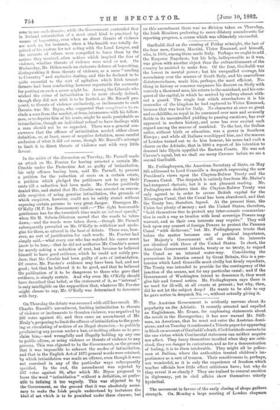In the midst of the discussion on Tuesday, Mr. Parnell
made an attack on Mr. Forster for having arrested a certain Mr.
Crosbie under the Protection Act as guilty of intimidation, his only offence having been, said Mr. Parnell, to present a petition for the reduction of rents on a certain estate, a petition which pledged the petitioners not to pay their rents till a reduction had been made. Mr. Forster positively denied this, and stated that Mr. Crosbie was arrested on reason- able suspicion of using genuine intimidation, the grounds of which suspicion, however, could not be safely stated without exposing certain persons to very great danger. Hereupon Mr. O'Kelly (M.P. for Roscommon) said :—" The right honourable gentleman has for the twentieth time made an infernal speech," when Sir H. Selwin-Ibbetson moved that the words be taken down,—and the words were taken down,--though Mr. Parnell subsequently prevailed on Mr. O'Kelly to withdraw and apolo- gise for them, as uttered in the heat of debate. There was, how- ever, no sort of justification for such words. Mr. Forster had simply said,—what every one who has watched his career must know to be true,—that he did not authorise Mr. Crosbie's arrest for merely asking a reduction of rent, but because he believed himself to have good evidence, which he could not safely pro- duce, that Mr. Crosbie had been guilty of acts of intimidation. Of course, Mr. Forster's evidence may have been bad, and not good ; but that he believed it to be good, and that he believed the publication of it to be dangerous to those who gave that evidence, is simply certain. And why even Mr. O'Kelly should have described that belief, or the statement of it, as " infernal " is only intelligible on the supposition that, whatever Mr. Forster might choose to say, Mr. O'Kelly was determined to denounce with fury.




































 Previous page
Previous page